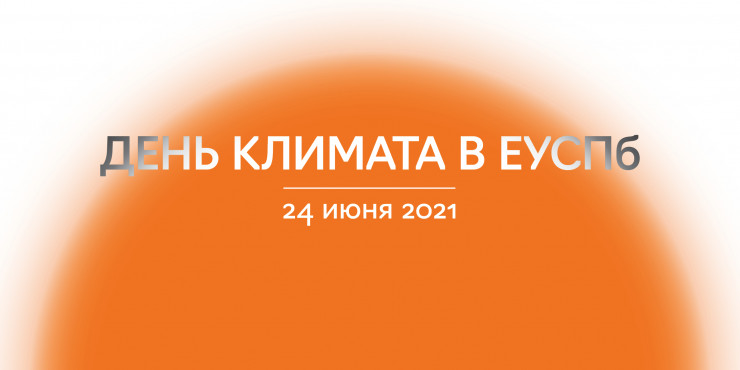
In 2020-21, the EUSP Center for Science and Technology Studies (STS Center) will start a new research project devoted to the issue of global climate change. In support of these research activities, we will also organize a series of public events, inviting some of Russia's leading climate scientists to speak at the European University and introduce the social science community to the issues related to climate change as they appear from the points of view of different natural science disciplines.
The rationale for the series is twofold. On the one hand, politicians and policy-makers enjoy access to the relevant data and expert advice derived from specific disciplinary perspectives. Yet, since disciplines tend to differ in their modeling cultures, the kinds of data they rely upon, as well as specific techniques of analysis and interpretation, a comprehensive policy-relevant view of climate change, even if achievable in principle, is continually postponed.
On the other hand, social scientists face a similar problem: it is becoming increasingly difficult to carry on with social research of any kind without noticing the proverbial elephant in the room — the issue of global warming. Yet when the social scientists begin to listen to their natural science colleagues, it turns out that the latter can only capture some part of the elephant but never «see it whole».
In other words, both communities need a big picture. The first purpose of this series is to make it possible. The second purpose is to create a forum in which natural and social scientists could discuss what is to be done — here and now. What policy options are available to adapt to climate change or mitigate its consequences, and which ones should be preferred in the contemporary Russian context?
Recordings of the past seminars
EUSP Seminar on Climate Change
- Sergey Gulev (Shirshov Institute of Oceanology, Russan Academy of Science): An Oceanologist's View on Global Climate Change
- Olga Solomina (Institute of Geography, Russian Academy of Science): What Do Scientists Know About the Climate of the Past, and Can We Trust It?
- Vladimir A. Semyonov (Obukhov Institute of Atmosphere Physics, and Institute of Geography, Russian Academy of Science): Changes in the Earth's Climate: Current Issues and Examples of Possible Solutions
- Oleg Anisimov (State Hydrological Institute, Roshydromet): Permafrost in the Past, Present, and Future
- Sergey Kirpotin (National Research University—Tomsk State University): Western Siberia as a Natural Collider: Climate-Regulating Function of Wetlands
- Vladimir Kattsov (Voeikov Main Geophysical Observatory, Roshydromet): Adaptation to Climate Change. Ouverture
- Natalia Lukina (Center of Forest Ecology and Productivity, Russian Academy of Sciences): The Forests' Role in Mitigating the Consequences of Climate Change
- Alexander Gel'fan (Water Problems Institute, Russian Academy of Sciences): Climate Change and the Increasing Threats of Water Security: Myths and Realities
- Anna Romanovskaya (Israel Institute of Global Climate and Ecology, Roshydromet): Climate Monitoring: Its Methods, Results, and Development Prospects in Russia
- Irina Kurganova (Institute of Physical-Chemical and Biological Problems of Soil Science, Russian Academy of Sciences): Global Changes in Land-Use and Their Influence on Carbon Balance and Climate
- Alexander Chernokul'sky (A.M. Obukhov Institute of Atmospheric Physics, Russian Academy of Science): Climate Engineering: Do Scientists Have an Emergency Plan?
Social Studies of Climate Change
- Stefan Schäfer (Institute for Advanced Sustainability Studies, Potsdam): Climate Geoengineering, Earth System Science, and the Co-production of Natural and Social Order
- Megan Black (MIT): The Global Interior
- Rebecca Elliott (LSE): Loss and the Social Life of Climate Change
- Roman Gil'mintinov (Duke, Tyumen University): Rent, Reproduction, Externalities: Political Economy of the Soviet Environmental Project
Climate Policy
- Nikolai Durmanov, Changing Climate: The Need for a National System of Carbon Accounting
-
EUSP Climate Day: Roundtable "Blindspots of Decarbonization Debate"
In the 2020-2021 academic year, all meetings will place on Thursdays, from 6 pm to 8 pm, in the Gagarinsky lecture hall.
The series is open to the public. Due to the current epidemiological conditions, we kindly ask all visitors to register via Timepad to ensure safe distancing. Each event will be live-streamed and made available on YouTube (English subtitles are generated automatically).
To join our mailing list and receive announcements and highlights, drop a line to dzhikharevich@eu.spb.ru
